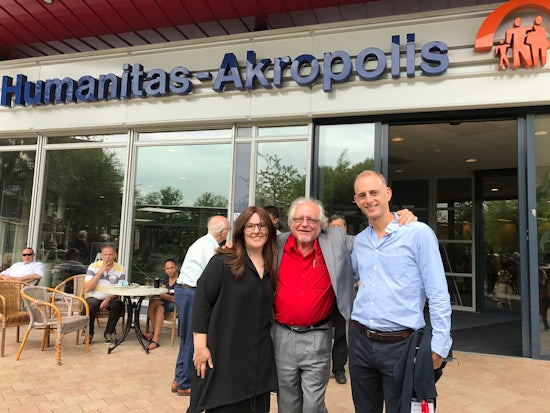Australia looks to the Netherlands to do dementia and aged care differently
A move away from the traditional ‘institutional’ model of aged and dementia care in the Netherlands has seen a spark for change among an Australian aged care advocate.

Tamar Krebs, Dr Hans Becker and Jonathan Gavshon at Humanitas apartments for life (Source: Tamar Krebs)
Following a recent visit to the Netherlands over April and May to view their aged and dementia care models, dementia expert and Group Homes Australia founder Tamar Krebs is calling for more choice and change in Australia’s aged care sector.
As part of the visit, Ms Krebs was introduced to the concept of the Humanitas ‘apartments for life’ which focus on care around conversations with people, engaging in life and enjoying a spectacular environment – not just ‘cure and care’.
“Humanitas really owns the concept of personalised care beyond just lip-service – the model at its core is about small-scale versus warehousing – small-scale enough that what they are doing is real,” she says.
“It’s about the human side of care and what people actually want compared to just what they are given through limited choice.
“Calling them ‘apartments for life’ really is a hallmark of the core difference between the two models – the Humanitas approach is about empowerment and purpose through assisted living.”
While agreeing that there is a place for all models of aged care, she says it comes down to a question of choice and lack thereof.
“Most people understand the shortcomings of the institutionalised model, particularly if they have ever visited one,” Ms Krebs says.
“In the Netherlands, they try and keep people in their local communities – no matter what their level of frailties.
“However when they get dementia, the idea is to introduce them into social models in the community – such as Group Homes – where as in Australia you wind up in a nursing home.”
The use of personalisation and integration of individual activities was also seen in the Humanitas apartments by Ms Krebs during her visit to assist those living with dementia.
“Humanitas introduced the concept of creating a space that ‘brings them back’ to their long term memories by using meaningful artefacts from their generation or period around the home,” Ms Krebs says.
“Residents who are surrounded by artefacts and reminders from their life who have purpose through being involved in the maintenance of their life are more at ease and less volatile.
“These artefacts help them to adjust and this simply is not feasible in large nursing homes.”
Through implementing some of the aged and dementia care strategies used in the Netherlands, Ms Krebs says positive differences can be made to senior people’s way of life.
“The Australian Government is already reviewing the way that the public receive funding and further modifications around how home residents are funded,” Ms Krebs says.
“By implementing change like that seen in the Netherlands, mood levels change and residents become happy as they are treated to memories that matter to them.
“In terms of international benchmarking, yes, I believe Australia has a way to go in regards to dementia care specifically – models such as the Group Homes model are commonplace around the globe, whereas we are the new kid on the block here.”
The visit to the Netherlands and associated calls for change come as the Australian Government opens up consultations on future care at home reforms to best help older Australians to live at home.























